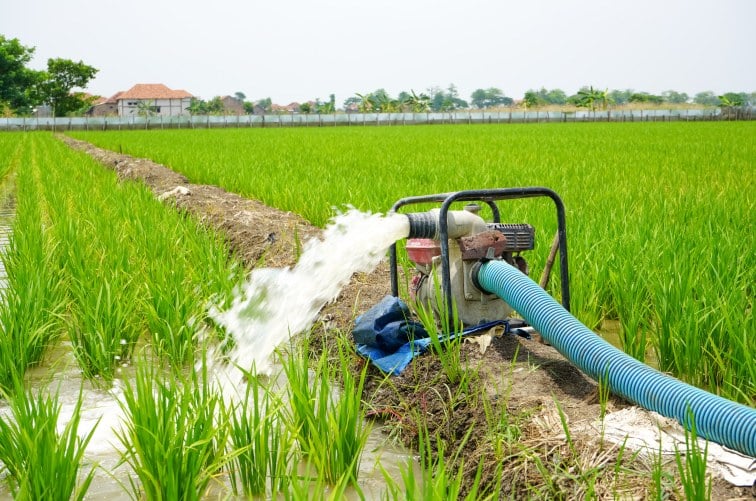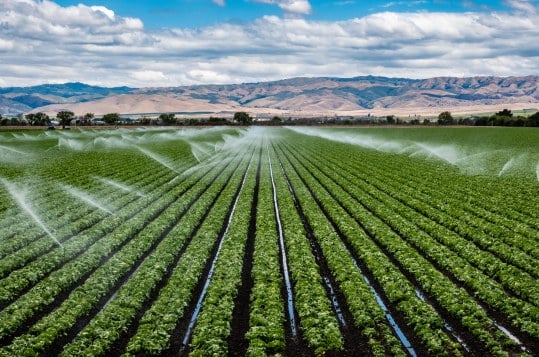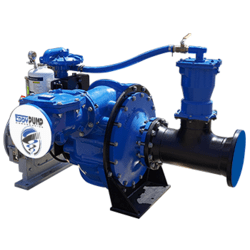Application of EDDY Pump in Irrigation



Application of Our Slurry Pumps in Irrigation

- Dredging and Desilting: A slurry pump dredge removes accumulated sediments, silt, and debris from irrigation canals, reservoirs, and water bodies. The heavy-duty slurry pump improves irrigation efficiency by maintaining water flow and preventing clogs.
- Water Transfer in Challenging Environments: In regions with uneven terrain or difficult access points, slurry transport pump excels at transferring water from one location to another. They can handle the presence of sand, gravel, and other solid materials often encountered in these environments.
- Reservoir Maintenance: The slurry transport pump helps maintain the quality and volume of water in irrigation reservoirs by preventing sediment buildup and ensuring a consistent supply of clean water to fields.
- Flood Control and Emergency Drainage: During heavy rainfall or unexpected flooding, slurry pumps rapidly remove excess water from fields and prevent crop damage. Their ability to handle debris-laden water is crucial in such scenarios.
- Hydroseeding: A high solids pump is used in hydroseeding applications, where a mixture of water, seeds, fertilizer, and other additives is sprayed onto land to establish vegetation. The pumps ensure an even distribution of the slurry mixture for successful revegetation.
- Lagoon Management: The slurry pump dredge agitates and transfers sludge from lagoons or settling ponds to facilitate proper treatment and disposal. This is important for maintaining water quality and preventing environmental contamination.
- Drip and Sprinkler System Maintenance: In irrigation systems utilizing drip or sprinkler technologies, a slurry transport pump can filter and circulate water, preventing blockages caused by sediment accumulation in the pipes and emitters.
- Irrigation of Sandy or Gravelly Soils: In areas with sandy or gravelly soils, slurry pumps aid in efficiently delivering water by preventing the clogging of irrigation equipment and maintaining consistent water distribution.
- Mining and Quarry Rehabilitation: In cases where irrigation is used for land reclamation after mining or quarrying activities, a high solids pump is utilized to manage water levels, sediment control, and revegetation efforts.
- Aquaculture: Slurry pumps are employed in aquaculture operations to maintain water quality by circulating and oxygenating water in ponds or tanks, especially in cases where solids and organic matter need to be managed.
CALL FOR SALES OR SUPPORT
If you need help with Pump Selection, Sales or Engineering Support
Call 619-345-5446

Application of EDDY Pump’s Hydraulic Dredging in Irrigation

- Canal Maintenance: Irrigation canals often accumulate sediments, silt, and debris over time, which can impede water flow and reduce the effectiveness of water distribution. Hydraulic dredger clears these canals, ensuring uninterrupted water flow to agricultural fields.
- Reservoir Desilting: Sediment buildup in irrigation reservoirs can lead to reduced water storage capacity and compromised water quality. Dredge pump systems remove accumulated sediments, restoring the reservoir’s capacity and maintaining clean water for irrigation.
- Waterway Restoration: Slurry pump dredge is utilized to restore natural waterways clogged or degraded due to sedimentation. By improving the navigability and flow of these water bodies, hydraulic dredging contributes to efficient water transport for irrigation purposes.
- Floodplain Management: In areas prone to flooding, hydraulic dredger creates or maintains flood channels that divert excess water away from agricultural fields during heavy rainfall, minimizing crop damage and ensuring proper drainage.
- Lagoon and Pond Desilting: Hydraulic dredging equipment is applied to lagoons and settling ponds used in irrigation systems to remove accumulated sludge and sediments, preventing water quality degradation and maintaining efficient water treatment processes.
- Erosion Control: Dredge pump systems can help in erosion control by stabilizing shorelines and riverbanks. Hydraulic dredging helps maintain the natural course of water bodies by removing sediment deposits, reducing erosion risk impacting irrigation infrastructure.
- Land Reclamation: In some cases, hydraulic dredging is employed as part of land reclamation projects to prepare sites for irrigation. It removes excess soil, sediments, and debris to create suitable agricultural land areas.
- Drip and Sprinkler System Maintenance: Hydraulic dredging can clear sediments and debris from water sources that supply drip and sprinkler irrigation systems. This helps prevent clogging of equipment and ensures consistent water distribution.
- Aquatic Habitat Restoration: The hydraulic dredger can be employed in irrigation-adjacent wetlands or water bodies to restore natural habitats for aquatic plants and animals. This can have positive ecological impacts while also benefiting irrigation practices.
- Silt Trap and Sediment Basin Cleaning: Slurry pump dredge is utilized to clean silt traps and sediment basins within irrigation systems. Removing accumulated sediments from these structures ensures continued functionality and prevents sediment from entering irrigation channels.




